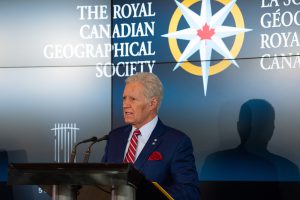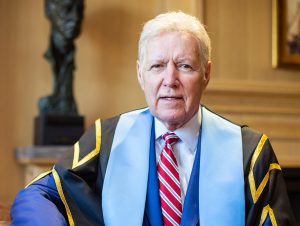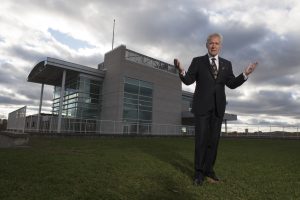
People & Culture
Alex Trebek and Canadian Geographic
Remembering Alex Trebek's legacy through stories of his work
- 802 words
- 4 minutes
People & Culture

For 90 years, The Royal Canadian Geographical Society has recognized achievements in geography, exploration and education, as well as outstanding contributions to the Society, through its awards program. This monumental anniversary year saw awards presented to the most diverse and star-studded group of individuals yet, among them Alex Trebek, Jane Goodall, Brian May of the band Queen, the 26th governor general of Canada Adrienne Clarkson, former Prime Minister Joe Clark, as well as explorers, scientists, teachers and philanthropists. Twenty awards were presented at a medal ceremony in the Alex Trebek Theatre at 50 Sussex on Nov. 21, while others received their awards at events earlier in the year. Here is the full list of 2019 award winners:
Mary Ellen Gucciardi
Mary Ellen Gucciardi is an accomplished educator with a passion for Canada’s North. An explorer, diver, mentor, author, documentary filmmaker and curriculum leader, she has dedicated her career to facilitating a better understanding of the High Arctic among Indigenous and non-Indigenous youth. As a secondary school teacher with the Dufferin-Peel Catholic District School Board, Mary Ellen has worked to bring Canada’s geography to life through innovative learning opportunities for students and teachers.
Andrew Young
Andrew Young’s advocacy for geography education takes many forms. As a teacher at Georges P. Vanier Secondary School in Courtenay, B.C., he connects geographical concepts with real life issues to demonstrate geography’s importance in understanding our world. Andrew has taught pre-service teachers, organized professional development sessions, and represented B.C. and the Yukon on the board of Canadian Geographic Education. A Fellow of the Society, Andrew is an unfailing promoter of geographic literacy.
Alex Trebek has been an international household name for more than 35 years as the host of Jeopardy!, but his support for student programs and humanitarian work has gone all but unknown to millions of his fans. His deeply-held belief that a knowledge of geography is essential to understanding and reacting to world events has led him to champion geographic education in Canada and beyond. He has received two Society medals and has served as its Honorary President since 2016.
Established in 2018, the Louie Kamookak medal is a distinction named for the Inuit historian and educator, awarded by the Society to any person or organization which has been brought to the attention of the Executive Committee, Awards Committee, or to the CEO, as having made Canada’s geography better known to Canadians and to the world. It is also awarded for a noteworthy deed that has served to advance the discipline of geography. The Society is pleased to present the Louis Kamookak medal to these 10 distinguished recipients:
Ron DiFrancesco
Tom Jackson
Jessie Jean
Lorie Karnath
Genesis P-Orridge
Cecil Paul
Andrew Pritchard
HIH Prince Ermias Sahle-Selassie
Michelle Valberg
Dr. Wayne Pollard
Dr. Wayne Pollard is an accomplished member of the permafrost research community. His scores of published articles, conference proceedings and book chapters have contributed to a better understanding of permafrost and groundwater systems in cold polar desert environments, the sustainability of physical and biological systems under current and future climates, and polar landscapes as planetary analogues. Throughout his career, Dr. Pollard has been committed to advancing knowledge about Canada’s north in collaboration with, and to the benefit of, Northern residents. His mentorship of a generation of experts ensures that his influence will continue to be felt for years to come.
Elizabeth A. Campbell
Elizabeth Campbell has dedicated her life to enhancing Canadians’ knowledge of this country’s incomparable geography. A photogrammetrist and pilot, she has also written extensively on cartography and satellite imagery, and embraced innovative technologies that enabled better mapping of the country. Indeed, her mastery of the field led to the identification of Landsat Island off the shores of Newfoundland and Labrador in 1976.
James E. Fordyce
James Fordyce is an explorer, sailor, business leader and philanthropist who, throughout his career and personal adventures, has forged an appreciation of the grandeur and diversity of Canadian landscapes both physical and cultural. His support of the Society ensures that Canadian Geographic Education can reach teachers and students nationwide with vital, innovative and bilingual resources such as the giant floor maps. The outcomes of his generosity include enhanced geographic literacy and a greater awareness and understanding of the country among young Canadians.
Charles “Chas” Yonge
Chas Yonge is known in Canada and abroad as an explorer, academic, and entrepreneur. An accomplished climber, hiker, skier and caver, Chas is credited with many first ascents and routes in the Bow Valley and elsewhere. As a researcher, he has contributed to the field of climate change reconstruction through his pioneering scientific study in karst climatology. Throughout his career, he has helped countless others gain an understanding and appreciation of our natural history.
Beth Dye
Beth Dye is an educator, coach, administrator and Fellow who has served the Society in a range of capacities for more than twenty years. A past recipient of the Society’s Geographic Literacy Award, Beth is dedicated to enhancing opportunities for Canadian students to pursue studies in geography. To this end, she championed the Society’s involvement in the International Geographical Union’s GeoOlympiad, which now affords Canadian senior secondary school students the opportunity to compete on the world stage.
Joseph Frey
Joseph Frey is an explorer, diver, writer, speaker, world traveler, and tireless advocate for the Society and its mission. As Chair of the Fellows Committee, he has succeeded in fulfilling the mandate to enlarge the College to more accurately reflect Canada’s diversity and to attract accomplished individuals who exemplify the Society’s values and share its mission. Joseph is an articulate and informed ambassador for the Society who often shares his world adventures with the readers of Canadian Geographic and Canadian Geographic Travel.
Anne Innis Dagg is widely considered to be the founder of giraffe science. In defiance of the social conventions of the 1950s, she travelled alone to Africa and became the first person to study the giraffe in the wild; the first zoologist to study any African animal in the wild; and an inventor of the scientific discipline of behavioural biology. More than six decades and copious academic papers and books later, she remains one of the world’s leading experts on the giraffe, Giraffa camelopardalis.
He may have written “We Will Rock You,” “Fat Bottomed Girls” and several more of the 20th century’s greatest rock songs, but he can also explain the theoretical Heat Death of the universe. As the lead guitarist of Queen, Brian May has used his enormous celebrity to promote greater public understanding of astrophysics, a field that can appear to many as dense as a black hole, but which represents so much of the hope for humanity, as well as the potential for discovery that lies ahead.
Richard Wiese
Richard Wiese is a world-renowned American explorer and respected field scientist who has popularized human and physical geography through his work as a writer and broadcaster. A lifelong advocate for the world’s unique places and cultures, he is a global leader in exploration by virtue of his role as President of the Explorers Club. Through his Born to Explore television series, Richard has showcased Canada, highlighting Indigenous peoples, natural wonders and wildlife to spark curiosity and foster active stewardship of the planet.
Richard Boudreault
Richard Boudreault is an internationally recognized leader in Arctic science and research. Since 2015, he has served as Chair of the Board of Polar Knowledge Canada, the agency responsible for the Canadian High Arctic Research Station (CHARS). He has demonstrated an irrefutable commitment to improving Northern research and integrating traditional knowledge of First Nations and Inuit communities in current and future polar research.
Jennifer Baichwal
Jennifer Baichwal is a celebrated documentary filmmaker, director, producer and writer whose body of work has garnered national and international acclaim. Jennifer shaped the premise and production of Anthropocene: The Human Epoch, which brings to the forefront evidence of the interplay between humans and the planet. With its multimedia approach, the Anthropocene Project encourages young and old to reflect and to act.

Edward Burtynsky
Edward Burtynsky is one of the planet’s most respected photographers. His signature large-scale photographs are widely acclaimed for their captivating and provocative depictions of the interplay between humans and the natural world, and are represented in the collections of museums and galleries around the world. His multimedia Anthropocene Project, created in collaboration with Jennifer Baichwal and Nicholas de Pencier, aims to engender a dialogue on sustainability, especially among youth.
Joe Clark
Charles Joseph “Joe” Clark is a distinguished Parliamentarian who has served Canadians as a Member of Parliament, the Secretary of State for External Affairs, a senior cabinet minister, Leader of the Official Opposition, and, in the highest elected office in the land, Prime Minister of Canada. As PM, Joe was among the world leaders 40 years ago at the G7 summit in Tokyo who showed remarkable foresight in supporting efforts to reduce oil consumption worldwide, expand alternative sources of energy and do more to help developing countries increase their use of renewable energy. A statesman, businessman, writer, education and politician, he has been awarded numerous honorary degrees and accolades that acknowledge his consensus diplomacy and the contributions he has made to shaping Canada.
As the 26th governor general of Canada, an accomplished journalist and the co-founder of the Institute for Canadian Citizenship, Adrienne Clarkson has shaped our understanding of Canadian identity for decades. As the Society’s Honorary Patron, Clarkson is a tireless advocate for its mission and values, and is herself an explorer, journeying across human, cultural and physical landscapes to foster the geographic concept of place, and a sense of identity, community and belonging.
Nicholas de Pencier
Nicholas de Pencier’s award-winning cinematography is a vital factor in the impact of the feature length documentary, Anthropocene: The Human Epoch. As Director of Photography for the film, Nick married his expertise with an appreciation for the gravity and importance of the subject: the deep and lasting impact of humankind on the natural landscape. His work will contribute immeasurably to the project’s aims to awaken consciousness and to encourage support for sustainable activity.
Andrew Feustel
Andrew Jay “Drew” Feustel is a geophysicist, astronaut, aquanaut and musician who holds dual Canadian and American citizenship. In May 2009, he repaired the Hubble space telescope as a mission specialist during his first space flight. In 2011, he flew on the final flight of Space Shuttle Endeavour. On his most recent mission, he commanded the International Space Station on Expedition 55/56. During the flight, he used Canadarm 2 to capture the Japanese HTV7 cargo spacecraft.
Jane Goodall is a primatologist, educator and activist globally renowned for her ground-breaking research with wild chimpanzees in Africa and for her tireless advocacy on behalf of the environment. Through the Jane Goodall Institute, which has 34 chapters around the world, and the Roots and Shoots program, Goodall continues to inspire new generations of conservationists to tackle the most pressing challenges of our time.
David Johnston
David Johnston is a statesman, legal scholar, educator and author who served with distinction as Canada’s 28th Governor General. During his tenure, he embraced the role of Patron of The Royal Canadian Geographical Society, upholding its educational mandate in an age of accelerated and unprecedented change. His commitment to education, learning and innovation, and to a caring Canada, are second to none, and his dedication to equality is evident in the Rideau Hall Foundation, which he established and continues to serve.
Harrison Schmitt
Dr. Harrison Hagan “Jack” Schmitt is an American geologist, astronaut, academic, author, politician and consultant in business, geology, space and public policy. He lent his expertise in lunar geology to NASA’s lunar program and joined the Apollo 17 mission as a civilian scientist. 2019 marks the 50th anniversary of the Apollo 8 moon landing and an appropriate occasion to recognize the singular achievement of the Apollo program, an enduring source of inspiration, education and information for the citizens of planet Earth.
Michael Ulica
Michael Ulica is the President and Chief Operating Officer of the National Geographic Society. He has previously held a number of executive positions with the Society, which has equipped him with an intimate knowledge of the organization’s ethos and operation and enables him to continue to deliver excellence across the Society and to move forward on its mission. A global geographic leader, Michael was also a driving force behind a new strategic partnership between the National Geographic Society and The Royal Canadian Geographical Society.
The W. Garfield Weston Foundation
The W. Garfield Weston Foundation has played a transformative role in northern science through its generous support of accomplished and emerging scholars and its collaboration with governments, scientists, Inuit communities and not-for-profit organizations. With foresight and acuity, the Weston Foundation has invested in northern research that studies the past, analyzes the present and will shape the future. The Foundation’s support has been instrumental to the design and delivery of Society programs, from the Victoria Strait Expedition to the bestselling Indigenous Peoples Atlas of Canada to Canadian Geographic Education’s Explorers-in-Residence classroom visits.
Dr. Derek Ford
Dr. Derek Ford is Canada’s leading expert on caves and karst development. For his more than sixty years of dedication and achievement in the field of karstology, he is recognized as one of the most respected cave scientists in the world. A recipient of the Society’s Gold Medal in 1986, Dr. Ford’s global influence is predicated on his rigorous and voluminous research, his mentoring of graduate students, and his advocacy for various UNESCO World Heritage Sites in Canada.
Arthur Ray (2018)
Arthur Ray, FRSC is a distinguished, internationally-recognized historical geographer who pioneered the use of the Hudson’s Bay Company’s vast archives to derive economic and ethno-historical data to interpret the historical geography of Canada’s First Nations from the time of first European contact. At the forefront of his field, his expertise also led him to become the principal historical geographical expert witness in major Native rights cases in Canada for over 25 years, where he played a pivotal role in bringing to the courts’ attention temporal and spatial perspectives on treaties, Indigenous title, and Métis rights.
Are you passionate about Canadian geography?
You can support Canadian Geographic in 3 ways:

People & Culture
Remembering Alex Trebek's legacy through stories of his work

People & Culture
While best known as the host of Jeopardy!, the Honorary President of The Royal Canadian Geographical Society was one of the planet's biggest champions of geographic knowledge and education

People & Culture
The story of how a critically endangered Indigenous language can be saved

People & Culture
A collection of photos showcase Alex Trebek's contributions to the Royal Canadian Geographical Society during his life